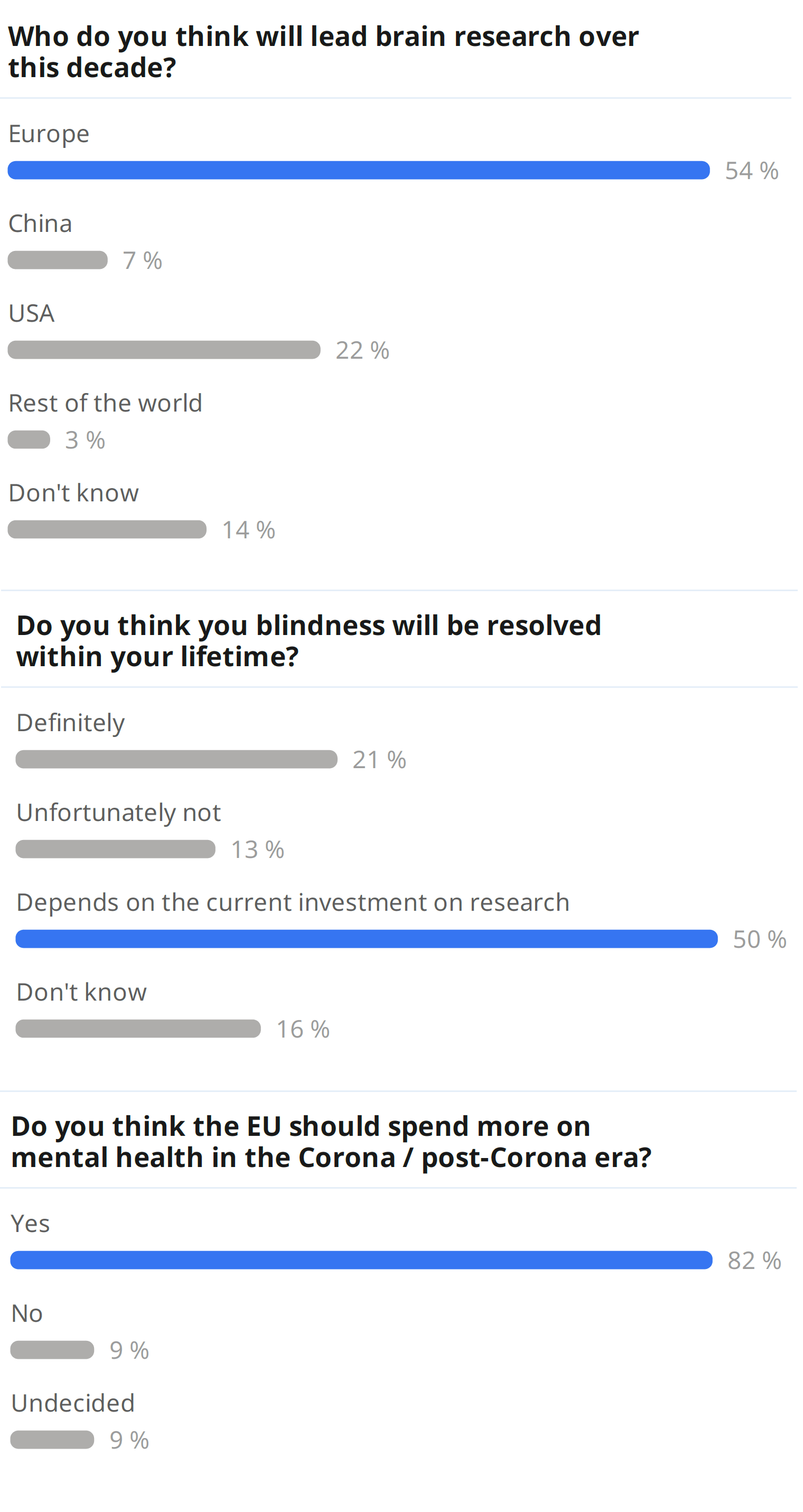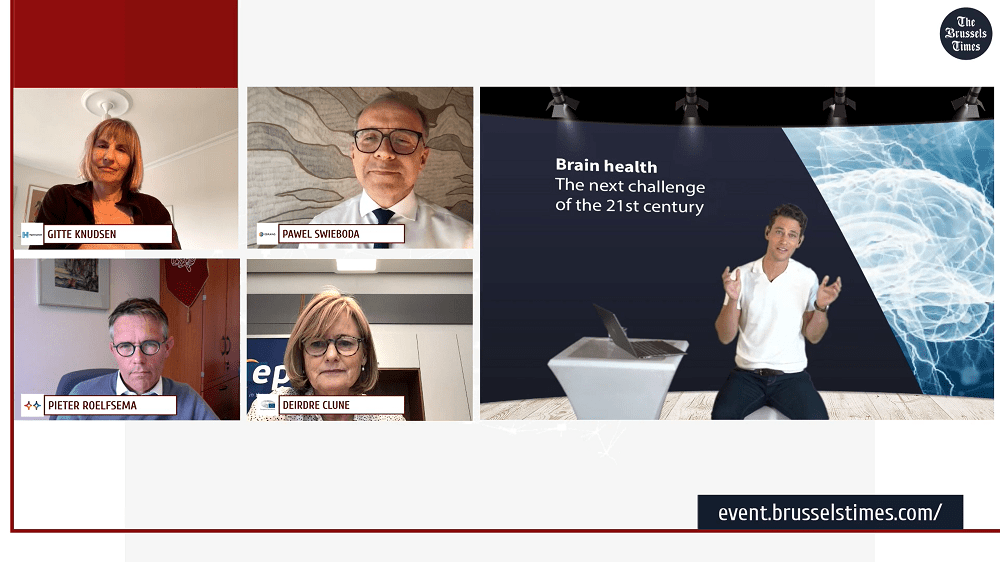How much do we understand about the brain and what is required to tackle the challenges in neuroscience and stimulate multidisciplinary research in Europe to generate a breakthrough in the treatment of brain-related diseases and disorders?
This was the main question at a webinar on Thursday (29 April) organised by EBRAINS, the new European digital Research Infrastructure for brain research, together with the Brussels Times and a panel of experts.
The massive impact of the COVID-19 pandemic on mental health has made it even more urgent to invest and act in the brain health domain according to EBRAINS, which is built by the EU-funded Human Brain Project.
In Europe, figures collected before the pandemic indicate that as many as 179 million people are affected by brain disorders, at the economic cost of over €800 billion per year, more than the GDP of most EU member states. The human costs and suffering are unmeasurable.
As populations are growing and ageing, innovation is required to develop effective and targeted prevention and treatment solutions. Despite largescale research programs aimed at improving early diagnosis and treatments, science has made progress in recent years, but no breakthrough has yet emerged to find a decisive cure for patients with brain-related disorders. But that is going to change.
“Our main objective is to become a leading reference point and platform for brain research, first in Europe and then globally in the long term,” explained Pawel Swieboda, CEO of EBRAINS and Director General of the Human Brain Project. “We hope to become the best in the class by offering access to data management tools, 3D brain mapping (atlas), and simulation tools.”
“We need to overcome the current fragmentation, explore deeper the brain but also to scale -up the research in multidisciplinary way. To achieve this, our platform has become an ever-increasing reservoir of research data that can be shared by scientists. Data storage requires high-performing super computers. We do encourage researchers to upload their data in our platform.”
“It may sound easy but is in reality very complicated,” he added, which was reiterated by Professor Gitte Knudsen from Copenhagen University Hospital. A persistent shortcoming in current research is the difficulty in replicating and validating research data.
She underlined the need to do much more in treating psychiatric disorders. “Today our knowledge about for example depression is very limited,” she said and anticipated the questions from the audience. Depression affects about 15 % of the population at some point of their lives, to the price of enormous personal and social costs.
“It’s a huge task to measure the severity of a depression since the diagnose doesn’t cover a specific type of the disease but a whole spectrum,” she explained and compared it to having a fever which can be a symptom of different diseases. “That’s why we need precision medicine to better target the parts of the brain that are directly related to a specific psychiatric disorder.”
Currently, medication with possible side-effects and lengthy therapies are applied to cure mental diseases and psychiatric disorders. A breakthrough in brain research would offer alternatives to these treatments, according to the panellists. Medicines (drugs) affect all brain cells while scientists are aiming at more precise interventions that only are targeting those cells that are causing the disorder.
Professor Pieter Roelfsema, Director of the Netherlands Institute for Neuroscience, exemplified with brain disorders that causes physical problems such as Parkinson’s disease and epilepsy. He is currently conducting a research project on a brain prosthesis which could restore visual function. The project represents a major discovery and was enabled by the EBRAINS research infrastructure.
In two years from now, he hopes to bring the technology to a new phase by testing it on human patients with sight disabilities. Restoring eyesight by 100 % is still far away in the future but he is convinced that we will see some progress in our life time.

Results from live polls that were answered by participants during the webinar.
Brain research raises also social, ethical and economic questions. Which countries in Europe and the rest of the world are leading the way in brain research? Are there bureaucratic hurdles that need to be overcome? Do we need to change lifestyles and reduce societal stigma and taboo often associated with brain-related disorders, just to mention some of the questions that were raised in the chat?
“We need to give science its justified space but also to oversee it and regulate where needed,” said Irish MEP Deirdre Clune (EPP), a member of relevant European Parliament committees such as Internal Market and Consumer Protection and the special committee on Beating Cancer.
“Our role as politicians is to coordinate research and provide sufficient funding to it,” she said and exemplified with the EU R&I flagship programme Horizon. The previous programme Horizon 2020 has been replaced by Horizon Europe (2021 – 2027) with a budget of €95.5 billion. The regulation was adopted by the European Parliament this week and is expected to enter into force in May.
She assured that the Parliament is aware of privacy and data protection concerns. “Data should be shared provided that identifying variables are removed,” she said. Professor Roelfsema added that an ethical framework for brain research is already in place and dismissed sci-fi scenarios such as mind reading and thought control.
The panellists agreed that Europe plays and should play an important global role in brain research and the creation of new medical companies as the result of such research. For the moment, EU and the US are in the forefront but other countries such as China and Japan are entering the field. However, neuroscience is still a largely unexplored field.
“I don’t see this this as a competition between countries but rather as a matter of cooperation and solidarity as we have seen after some hesitancy in the global response to the COVID-19 crisis,” said professor Knudsen. “If you aren’t part of the development, you risk of being left behind. I would be happy to share data with the rest of the world.”
Brain research is about our intelligence and what makes us human, finished Pawel Swieboda. “And that’s why it is the challenge of the century.”
The Brussels Times

